- AyurVAID Pharmacy
Parkinson’s Disease is part of a group of common neurodegenerative diseases that occur due to damage to specific brain neurons responsible for coordination and precise muscle control, , and can be addressed through approaches like parkinson ayurveda.
Neurodegenerative disorders affecting brain cells slowly damage the nervous system. These disorders develop over time, with symptoms usually appearing later in life.
Parkinsonism is a group of diseases that includes types of Parkinson’s Disease – Typical and Atypical, and Secondary forms of Parkinsonism.
Parkinson’s Disease accounts for nearly 80% of all Parkinsonism and typically presents with symptoms like tremors, stiffness, and slow movement (motor symptoms). Symptoms like constipation, a reduced sense of smell, sleep disturbances, reduced facial expressions, and a low voice (non-motor symptoms) can appear years before clinical diagnosis.
This disorder results from damage to the nerve cells that produce dopamine within the body. Dopamine is a neurotransmitter necessary for smooth and coordinated muscle movements. Degeneration in these neuronal pathways is due to the toxic accumulation of clumps of proteins known as Lewy bodies. The most common treatment modality for Parkinson’s Disease centres on increasing the levels of dopamine by providing its precursor Levodopa or inhibitors of dopamine breakdown. As the disease worsens, higher doses of Levodopa are needed, which causes motor side effects and abrupt changes as a response to Levodopa.
Apollo AyurVAID uses the Precision Ayurveda approach to manage Parkinson’s Disease. It emphasises the root cause and the individual’s specific imbalances. This personalised treatment offers three significant clinical advantages:
Slowing Disease Progression: Ayurveda may help alter the neurodegenerative process from the early (prodromal) stage onward.
Reducing Side Effects: Ayurvedic interventions can effectively decrease the incident rates and the severity of these side effects associated with conventional Parkinson’s Disease therapies.
Improving Non-Motor Symptoms: Ayurveda manages many symptoms related to sleep disorders, constipation, anxiety, and even cognitive decline, thus uplifting the general quality of life.
Early-stage Parkinson’s Disease: It helps slow disease progression and manage symptoms
Young-onset Parkinson’s Disease: Parkinsonism is most commonly seen in older adults; however, approximately 10% of cases occur at or before the age of 50, termed as Young-Onset Parkinson’s Disease (YOPD).
Chronic and stable Parkinson’s Disease: Without any life-threatening deviations in vital parameters.
🚫 Patients with severe cognitive decline or psychological disorders (e.g., dementia, psychosis, depression).
🚫 Extremely fragile patients who may not tolerate intensive Ayurvedic therapies.
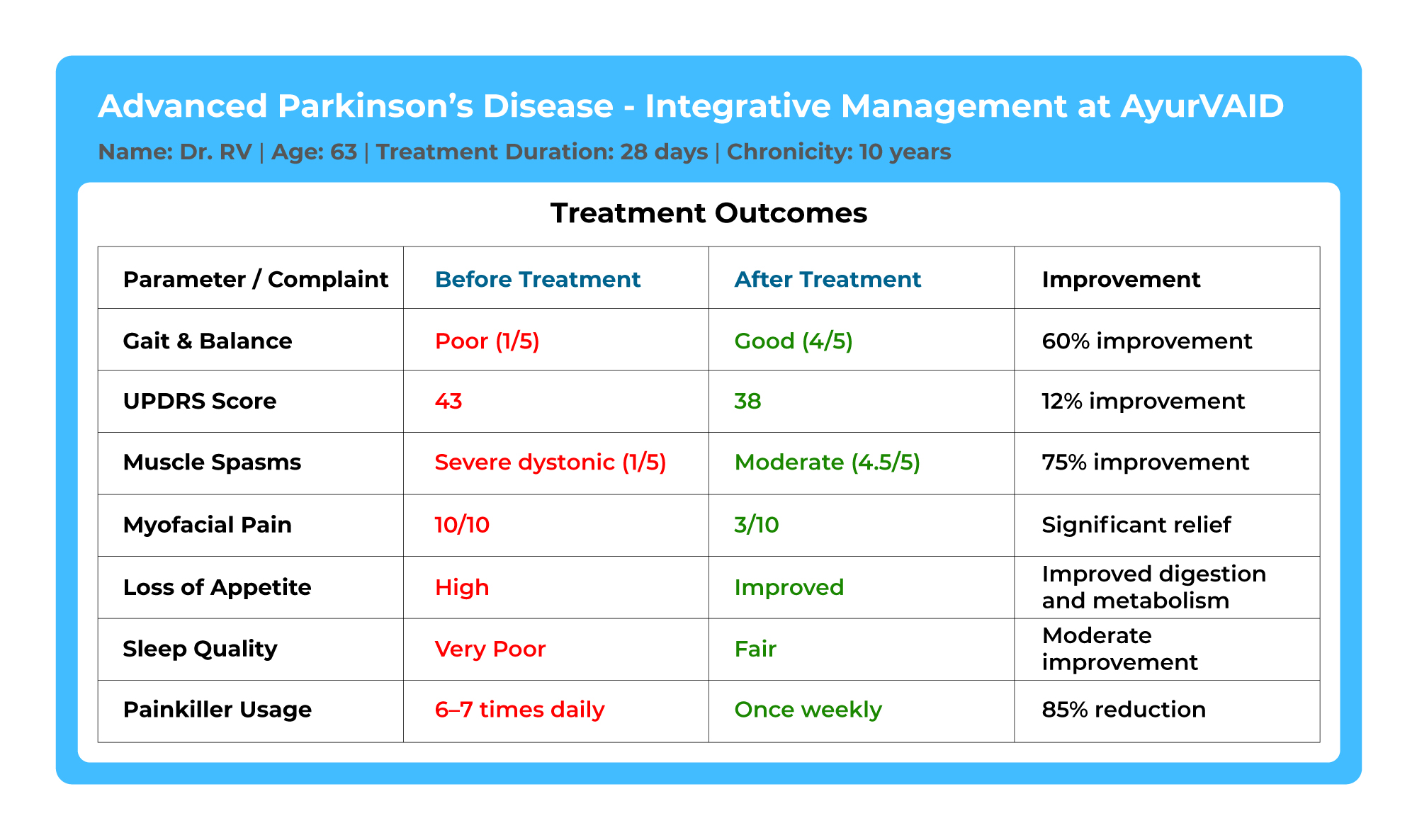
Conventional medicine focuses on managing motor symptoms by employing dopaminergic drugs like Levodopa to supplement the loss of dopamine levels in the brain’s striatum. However, if taken for a long time, Levodopa can produce side effects in the form of dyskinesias (involuntary movements) and dystonia (muscle stiffness) and doesn’t modify the course of Parkinson’s disease (PD). Parkinson ayurvedic treatment is being explored as a complementary approach to help manage symptoms and improve quality of life. Patients may experience a wearing-off effect, whereby symptoms reappear before the next scheduled dose of medication, thus becoming more challenging to manage over time.
The Apollo AyurVAID treatment philosophy centers on a multi-modal treatment potential, including symptomatic relief, disease progression control, and improved quality of life. Outcomes may vary from patient to patient; however, most patients can expect the following outcomes:
The involuntary and rhythmic movements of the hands, arms, legs, and jaw. It is often more pronounced at rest (Resting Tremor) and reduces when the affected part is used for some activity. Tremors affecting the thumb and index finger are popularly known as ‘Pill-rolling’ tremors.
Rigidity refers to increased muscle tone or stiffness, which is mainly seen in the arms, shoulders, or neck and creates problems with movement and discomfort.
This makes it difficult to perform everyday tasks.
This often leads to decreased mental skill or reaction time, voice changes, decreased facial expression, etc.
A stooped and flexed posture with bending at the elbows, knees, and hips.
Reduced frequency of blinking, trouble swallowing, and enhanced drooling.
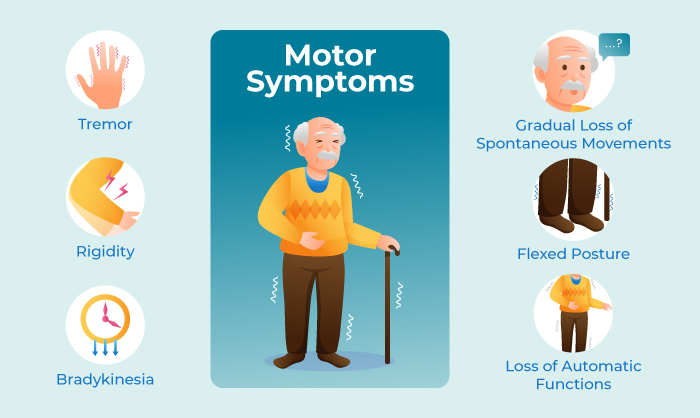
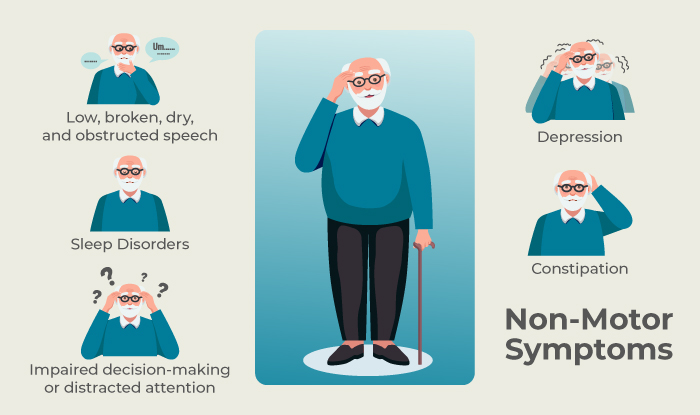
According to the Ayurveda perspective, Parkinson’s Disease is a palpable example of an aggravated state of Vata, particularly affecting the majja dhatu (nervous system) and srotas (subtle channels). All these changes correlate very well with the recent findings demonstrating that Parkinson’s Disease may originate in the gut. This realisation strengthens the Ayurveda view, wherein gut and neurological disorders are believed to be rooted in disturbed Vata in Koshtha. As a result, early gut-related symptoms like constipation act as alarm signs.
Parkinson’s Disease has pre-disease symptoms that can appear months to decades before diagnosis. These include constipation (affecting nearly 80% of patients), loss of smell, reduced facial expressions, low voice, sleep disturbances, and dizziness. Constipation, in particular, often develops years before other symptoms emerge.
Stages of Motor Symptoms
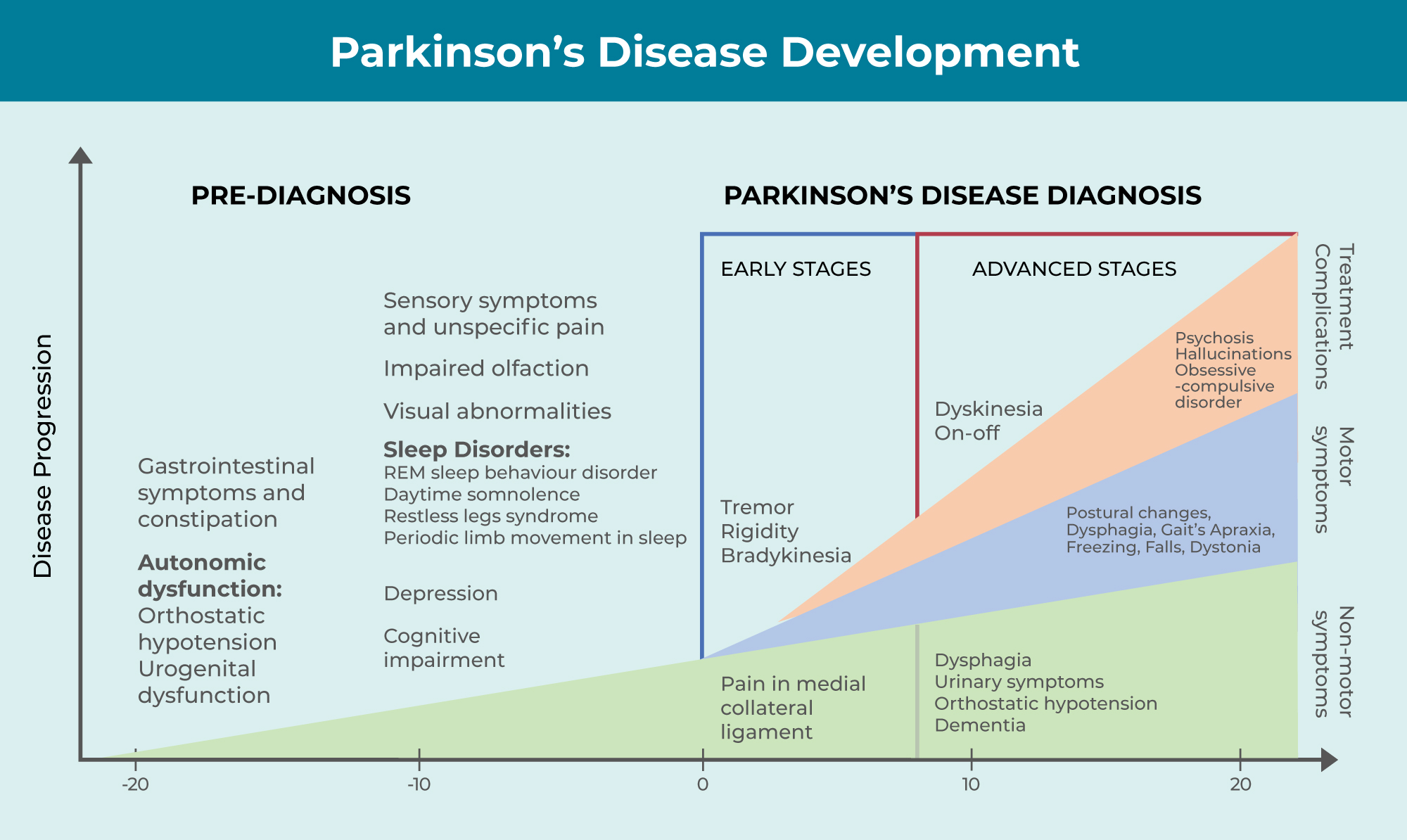
SOURCE: Castilla-Cortázar, I., Aguirre, G.A., Femat-Roldán, G. et al. Is insulin-like growth factor-1 involved in Parkinson’s disease development?. J Transl Med 18, 70 (2020).
Parkinson’s Disease is caused by dopamine depletion due to the degeneration of dopamine-producing neurons in the nigrostriatal pathway. The damage is linked to misfolded α-synuclein proteins that form Lewy bodies, which spread like prions and kill neurons.
An elevated state of Vata (Vata prakopa) leads to tissue depletion in the nervous system, ama accumulation forms obstructions similar to Lewy bodies, and majja dhatu dushti leads to impaired nerve signal conduction.
Constipation (affecting ~80% of Parkinson’s Disease patients) appears years before diagnosis, indicating early nervous system involvement. α-synuclein pathology develops first in the gut’s enteric nervous system (ENS) before reaching the brain.
The dysfunctional Apana Vata (a sub-type of Vata responsible for elimination) can serve as an early warning sign for constipation. Purishavaha Sroto Dushti (impairment of fecal channels) precedes neurological symptoms.
Serotonin-producing neurons decline before dopamine neurons, suggesting a broader neurotransmitter imbalance; 90% of serotonin is produced in the gut.
The Imbalance of Pachaka Pitta and Samana Vata (Pitta subtype responsible for digestion and Vata subtype for ignition of digestive fire) significantly influences neurotransmitter synthesis within the gut, leading to subsequent disruption of tissue metabolism and neurotransmitter synthesis, thereby depicting the gut-brain axis.
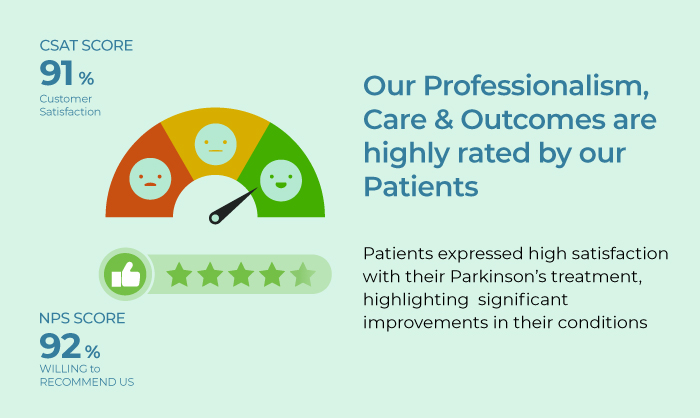
Deepana-Pachana (Enhancement of Digestion & Metabolism): The use of herbs to stimulate Agni (the digestive fire) and to reduce the effects of Ama (tissue inflammation).
Rookshana (Drying therapies): Medicines are used to negate the excessive involvement of Kapha in the first stage, wherein Kapha obstructs the normal functioning of Vata.
Snehana (Oleation Therapy): Abhyanga (External) uses Vata-pacifying oils to reduce rigidity and tremors and enhance flexibility.
Snehapana (Internal administration of medicated ghee): This therapy nourishes the nervous system and supports brain function. In addition, it liquefies the stool and relieves constipation.
Swedana (Steam Therapy): Uses herbal steam for relaxing muscles, alleviating stiffness, and preparing tissues for the primary procedures.
Vasti (Enemas): Intestine is the principal site of Vata. Hence, Vasti therapy becomes the major panchakarma in managing Kampavata and addressing gut-brain axis dysfunction, which influences the disease progression. It also helps empty the bowel properly and relieves constipation accompanying Parkinson’s Disease. This depends on the patient’s condition and is administered as alternate sequences for 8, 14, or 21 days.
Anuvasana Vasti (Oil-Based): Sesame or medicated oil with minor quantities of herbal decoctions is administered to nourish the nerves.
Niruha Vasti (Decoction-Based): Detoxifying and balancing Vata, a combination of herbal decoction, honey, salt, herbal paste, and a little oil is administered.
Nasya (Nasal instillation): In pre-motor Parkinson’s Disease (Braak’s staging), the degeneration of Lewy body starts in the olfactory lobe; therefore, nasal treatment gives access to the brain. The nasally-administered medicated oils contribute neuroprotective herbs to the brain for cognitive enhancement and relief from motor symptoms.
Virechana (Purgation): This would displace toxic factors from the body, balance Vata dosha, and improve neurological functioning. Most suitable for early-onset Parkinson’s Disease and middle-aged patients, this treatment is not recommended for those above 60 years and with comorbidities.
Shirodhara (Oil or decoction stream over forehead): This helps bring improvement in mental and cognitive well-being, reducing anxiety, depression, and hallucination symptoms with Parkinson’s Disease.
Medhya Rasayanas (Brain tonics): These medicines help sharpen memory, support cognitive functions, reduce strains, improve neuronal health, and ensure healthy mental clarity with neuroprotection.
Caution: Kapikachu( Mucuna pruriens ), a well-known traditional Ayurveda herb, holds many possible therapeutic advantages over Parkinson’s Disease; however, it should be used within limits due to its extremely potent bioactive compounds, most notably Levodopa (L-dopa). Overconsumption can lead to neurological, cardiovascular, and gastrointestinal issues; hence, herbal medication should not be self-administered. Use in pregnancy and lactation should also be avoided unless prescribed.
Ingest lighter, warmer food, and keep a regular meal time to avoid aggravating Vata.
Cumin, pepper, and ginger are good in aiding digestion and lowering nerve degradation.
Lifestyle Modifications
Establishing a regular sleep pattern and incorporating gentle exercise, pranayama, and yogasanas may help improve mobility and nerve stability.
Ayurveda manages the entire spectrum of symptoms in a person with Parkinson’s Disease while maximising the effects of levodopa. It uses a range of treatments, including kampavata ayurvedic treatment, panchakarma, herbal preparations, dietary changes, and lifestyle alterations, all aimed at ameliorating symptoms and improving the quality of life. These therapies require the supervision of a qualified Ayurveda practitioner and must be personalised to define patient preferences.
AyurVAID follows a structured, protocol-driven approach to ensure effective treatment and sustainable recovery.
To ensure effective treatment and track progress, baseline values are taken using:
Disease Standard Scales: International scales such as UPDRS (Unified Parkinson’s Disease Rating Scale) and MDS-UPDRS (Movement Disorder Society-Unified Parkinson’s Disease Rating Scale) evaluate motor and non-motor symptoms and daily living activities.
Biomarkers and Imaging Techniques: To assess progress and improvements.
Patient-Reported Outcomes: To track improvement while maintaining transparency and avoiding bias.
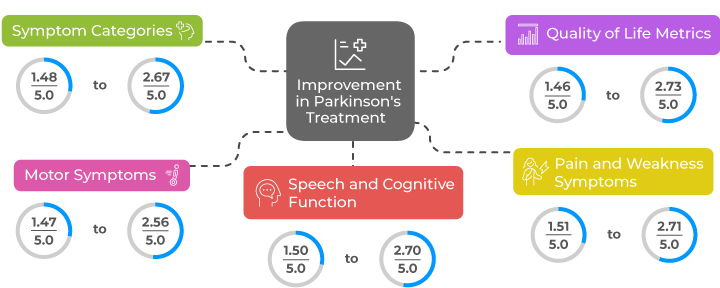
Case 1: A case of an elderly woman patient aged 66 with Cervical Spondylosis and diagnosed with the idiopathic type of Parkinson's Disease eight years ago
Case Summary: The present complaint was found to be bilateral tremors with right-sided predominance, neck and back pains with radiation to the limbs, considerable weight loss, and positional vertigo. At the time of assessment, the mobility and activities of daily living were found to be moderately affected and considerably impaired, with scores in standard parameters (UPDRS(Unified Parkinson's Disease Rating Scale): 40.7% disability; Dynamic Gait Index: 12/24).
Marked improvement was observed after subjects underwent intensive 15 days of Ayurveda treatment, using several therapies such as Abhyanga, Nasya, and Shirodhara.
Post-treatment assessments showed improvement in UPDRS (from 40.7% to 21.6%) and Dynamic Gait Index (from 12/24 to 20/24), along with noted improvements in gait, tremors, muscle strength, and sleep quality. The patient was given dietary recommendations, lifestyle changes, and maintenance medications to sustain the improvements.
Case 2: 74-year-old male patient suffering from Parkinsonism for six years
Case Summary: The patient is said to have had difficulty walking for six years, slowness of activities, tremors in the hands and legs, and rigidity. The patient has also had hallucinations for 1.5 years apart from the other symptoms, has increased difficulty in swallowing, and over the last few weeks has reported poor appetite, low energy, and constipation. Initial neurological assessment showed only mild dysarthria, short-term memory loss, slow speech, impairment in finger-to-nose secondary to tremors, and resting tremors in the upper limb. Radiological MRI showed cerebral atrophy and chronic small vessel ischemic changes along with chronic multi-lacunar infarcts. The patient was wheelchair dependent on admission.
The patient was treated with intensive Ayurveda therapies and medicines for 21 days. Therapies such as Nasya, Shiro Lepa, Sarvanga Pathrapinda Sweda, Matravasti, Shirodhara, Sarvanga Kayaseka, and Sarvanga Shashtika Shali Pinda Sweda, along with oral medications, were administered.

As we work hard to improve our services, your feedback is important to us. Please take a moment to help us serve you better.
The information provided in this blog is for general informational purposes only and is not intended as a substitute for professional medical advice, diagnosis, or treatment. Always seek the advice of your physician, Ayurvedic practitioner, or other qualified healthcare provider with any questions you may have regarding a medical condition or treatment.
Subscribe to our hospital newsletter for the latest health tips, updates on services, patient stories, and community events. Sign up today and stay informed!
Parkinson’s Disease is part of a group of common neurodegenerative diseases that occur due to damage to specific brain neurons responsible for coordination and precise muscle control, , and can be addressed through approaches like parkinson ayurveda.
Neurodegenerative disorders affecting brain cells slowly damage the nervous system. These disorders develop over time, with symptoms usually appearing later in life.
Parkinsonism is a group of diseases that includes types of Parkinson’s Disease – Typical and Atypical, and Secondary forms of Parkinsonism.
Parkinson’s Disease accounts for nearly 80% of all Parkinsonism and typically presents with symptoms like tremors, stiffness, and slow movement (motor symptoms). Symptoms like constipation, a reduced sense of smell, sleep disturbances, reduced facial expressions, and a low voice (non-motor symptoms) can appear years before clinical diagnosis.
This disorder results from damage to the nerve cells that produce dopamine within the body. Dopamine is a neurotransmitter necessary for smooth and coordinated muscle movements. Degeneration in these neuronal pathways is due to the toxic accumulation of clumps of proteins known as Lewy bodies. The most common treatment modality for Parkinson’s Disease centres on increasing the levels of dopamine by providing its precursor Levodopa or inhibitors of dopamine breakdown. As the disease worsens, higher doses of Levodopa are needed, which causes motor side effects and abrupt changes as a response to Levodopa.
Apollo AyurVAID uses the Precision Ayurveda approach to manage Parkinson’s Disease. It emphasises the root cause and the individual’s specific imbalances. This personalised treatment offers three significant clinical advantages:
Slowing Disease Progression: Ayurveda may help alter the neurodegenerative process from the early (prodromal) stage onward.
Reducing Side Effects: Ayurvedic interventions can effectively decrease the incident rates and the severity of these side effects associated with conventional Parkinson’s Disease therapies.
Improving Non-Motor Symptoms: Ayurveda manages many symptoms related to sleep disorders, constipation, anxiety, and even cognitive decline, thus uplifting the general quality of life.
Early-stage Parkinson’s Disease: It helps slow disease progression and manage symptoms
Young-onset Parkinson’s Disease: Parkinsonism is most commonly seen in older adults; however, approximately 10% of cases occur at or before the age of 50, termed as Young-Onset Parkinson’s Disease (YOPD).
Chronic and stable Parkinson’s Disease: Without any life-threatening deviations in vital parameters.
🚫 Patients with severe cognitive decline or psychological disorders (e.g., dementia, psychosis, depression).
🚫 Extremely fragile patients who may not tolerate intensive Ayurvedic therapies.

Conventional medicine focuses on managing motor symptoms by employing dopaminergic drugs like Levodopa to supplement the loss of dopamine levels in the brain’s striatum. However, if taken for a long time, Levodopa can produce side effects in the form of dyskinesias (involuntary movements) and dystonia (muscle stiffness) and doesn’t modify the course of Parkinson’s disease (PD). Parkinson ayurvedic treatment is being explored as a complementary approach to help manage symptoms and improve quality of life. Patients may experience a wearing-off effect, whereby symptoms reappear before the next scheduled dose of medication, thus becoming more challenging to manage over time.
The Apollo AyurVAID treatment philosophy centers on a multi-modal treatment potential, including symptomatic relief, disease progression control, and improved quality of life. Outcomes may vary from patient to patient; however, most patients can expect the following outcomes:
The involuntary and rhythmic movements of the hands, arms, legs, and jaw. It is often more pronounced at rest (Resting Tremor) and reduces when the affected part is used for some activity. Tremors affecting the thumb and index finger are popularly known as ‘Pill-rolling’ tremors.
Rigidity refers to increased muscle tone or stiffness, which is mainly seen in the arms, shoulders, or neck and creates problems with movement and discomfort.
This makes it difficult to perform everyday tasks.
This often leads to decreased mental skill or reaction time, voice changes, decreased facial expression, etc.
A stooped and flexed posture with bending at the elbows, knees, and hips.
Reduced frequency of blinking, trouble swallowing, and enhanced drooling.


According to the Ayurveda perspective, Parkinson’s Disease is a palpable example of an aggravated state of Vata, particularly affecting the majja dhatu (nervous system) and srotas (subtle channels). All these changes correlate very well with the recent findings demonstrating that Parkinson’s Disease may originate in the gut. This realisation strengthens the Ayurveda view, wherein gut and neurological disorders are believed to be rooted in disturbed Vata in Koshtha. As a result, early gut-related symptoms like constipation act as alarm signs.
Parkinson’s Disease has pre-disease symptoms that can appear months to decades before diagnosis. These include constipation (affecting nearly 80% of patients), loss of smell, reduced facial expressions, low voice, sleep disturbances, and dizziness. Constipation, in particular, often develops years before other symptoms emerge.
Stages of Motor Symptoms

SOURCE: Castilla-Cortázar, I., Aguirre, G.A., Femat-Roldán, G. et al. Is insulin-like growth factor-1 involved in Parkinson’s disease development?. J Transl Med 18, 70 (2020).
Parkinson’s Disease is caused by dopamine depletion due to the degeneration of dopamine-producing neurons in the nigrostriatal pathway. The damage is linked to misfolded α-synuclein proteins that form Lewy bodies, which spread like prions and kill neurons.
An elevated state of Vata (Vata prakopa) leads to tissue depletion in the nervous system, ama accumulation forms obstructions similar to Lewy bodies, and majja dhatu dushti leads to impaired nerve signal conduction.
Constipation (affecting ~80% of Parkinson’s Disease patients) appears years before diagnosis, indicating early nervous system involvement. α-synuclein pathology develops first in the gut’s enteric nervous system (ENS) before reaching the brain.
The dysfunctional Apana Vata (a sub-type of Vata responsible for elimination) can serve as an early warning sign for constipation. Purishavaha Sroto Dushti (impairment of fecal channels) precedes neurological symptoms.
Serotonin-producing neurons decline before dopamine neurons, suggesting a broader neurotransmitter imbalance; 90% of serotonin is produced in the gut.
The Imbalance of Pachaka Pitta and Samana Vata (Pitta subtype responsible for digestion and Vata subtype for ignition of digestive fire) significantly influences neurotransmitter synthesis within the gut, leading to subsequent disruption of tissue metabolism and neurotransmitter synthesis, thereby depicting the gut-brain axis.

Deepana-Pachana (Enhancement of Digestion & Metabolism): The use of herbs to stimulate Agni (the digestive fire) and to reduce the effects of Ama (tissue inflammation).
Rookshana (Drying therapies): Medicines are used to negate the excessive involvement of Kapha in the first stage, wherein Kapha obstructs the normal functioning of Vata.
Snehana (Oleation Therapy): Abhyanga (External) uses Vata-pacifying oils to reduce rigidity and tremors and enhance flexibility.
Snehapana (Internal administration of medicated ghee): This therapy nourishes the nervous system and supports brain function. In addition, it liquefies the stool and relieves constipation.
Swedana (Steam Therapy): Uses herbal steam for relaxing muscles, alleviating stiffness, and preparing tissues for the primary procedures.
Vasti (Enemas): Intestine is the principal site of Vata. Hence, Vasti therapy becomes the major panchakarma in managing Kampavata and addressing gut-brain axis dysfunction, which influences the disease progression. It also helps empty the bowel properly and relieves constipation accompanying Parkinson’s Disease. This depends on the patient’s condition and is administered as alternate sequences for 8, 14, or 21 days.
Anuvasana Vasti (Oil-Based): Sesame or medicated oil with minor quantities of herbal decoctions is administered to nourish the nerves.
Niruha Vasti (Decoction-Based): Detoxifying and balancing Vata, a combination of herbal decoction, honey, salt, herbal paste, and a little oil is administered.
Nasya (Nasal instillation): In pre-motor Parkinson’s Disease (Braak’s staging), the degeneration of Lewy body starts in the olfactory lobe; therefore, nasal treatment gives access to the brain. The nasally-administered medicated oils contribute neuroprotective herbs to the brain for cognitive enhancement and relief from motor symptoms.
Virechana (Purgation): This would displace toxic factors from the body, balance Vata dosha, and improve neurological functioning. Most suitable for early-onset Parkinson’s Disease and middle-aged patients, this treatment is not recommended for those above 60 years and with comorbidities.
Shirodhara (Oil or decoction stream over forehead): This helps bring improvement in mental and cognitive well-being, reducing anxiety, depression, and hallucination symptoms with Parkinson’s Disease.
Medhya Rasayanas (Brain tonics): These medicines help sharpen memory, support cognitive functions, reduce strains, improve neuronal health, and ensure healthy mental clarity with neuroprotection.
Caution: Kapikachu( Mucuna pruriens ), a well-known traditional Ayurveda herb, holds many possible therapeutic advantages over Parkinson’s Disease; however, it should be used within limits due to its extremely potent bioactive compounds, most notably Levodopa (L-dopa). Overconsumption can lead to neurological, cardiovascular, and gastrointestinal issues; hence, herbal medication should not be self-administered. Use in pregnancy and lactation should also be avoided unless prescribed.
Ingest lighter, warmer food, and keep a regular meal time to avoid aggravating Vata.
Cumin, pepper, and ginger are good in aiding digestion and lowering nerve degradation.
Lifestyle Modifications
Establishing a regular sleep pattern and incorporating gentle exercise, pranayama, and yogasanas may help improve mobility and nerve stability.
Ayurveda manages the entire spectrum of symptoms in a person with Parkinson’s Disease while maximising the effects of levodopa. It uses a range of treatments, including kampavata ayurvedic treatment, panchakarma, herbal preparations, dietary changes, and lifestyle alterations, all aimed at ameliorating symptoms and improving the quality of life. These therapies require the supervision of a qualified Ayurveda practitioner and must be personalised to define patient preferences.
AyurVAID follows a structured, protocol-driven approach to ensure effective treatment and sustainable recovery.
To ensure effective treatment and track progress, baseline values are taken using:
Disease Standard Scales: International scales such as UPDRS (Unified Parkinson’s Disease Rating Scale) and MDS-UPDRS (Movement Disorder Society-Unified Parkinson’s Disease Rating Scale) evaluate motor and non-motor symptoms and daily living activities.
Biomarkers and Imaging Techniques: To assess progress and improvements.
Patient-Reported Outcomes: To track improvement while maintaining transparency and avoiding bias.

Case 1: A case of an elderly woman patient aged 66 with Cervical Spondylosis and diagnosed with the idiopathic type of Parkinson's Disease eight years ago
Case Summary: The present complaint was found to be bilateral tremors with right-sided predominance, neck and back pains with radiation to the limbs, considerable weight loss, and positional vertigo. At the time of assessment, the mobility and activities of daily living were found to be moderately affected and considerably impaired, with scores in standard parameters (UPDRS(Unified Parkinson's Disease Rating Scale): 40.7% disability; Dynamic Gait Index: 12/24).
Marked improvement was observed after subjects underwent intensive 15 days of Ayurveda treatment, using several therapies such as Abhyanga, Nasya, and Shirodhara.
Post-treatment assessments showed improvement in UPDRS (from 40.7% to 21.6%) and Dynamic Gait Index (from 12/24 to 20/24), along with noted improvements in gait, tremors, muscle strength, and sleep quality. The patient was given dietary recommendations, lifestyle changes, and maintenance medications to sustain the improvements.
Case 2: 74-year-old male patient suffering from Parkinsonism for six years
Case Summary: The patient is said to have had difficulty walking for six years, slowness of activities, tremors in the hands and legs, and rigidity. The patient has also had hallucinations for 1.5 years apart from the other symptoms, has increased difficulty in swallowing, and over the last few weeks has reported poor appetite, low energy, and constipation. Initial neurological assessment showed only mild dysarthria, short-term memory loss, slow speech, impairment in finger-to-nose secondary to tremors, and resting tremors in the upper limb. Radiological MRI showed cerebral atrophy and chronic small vessel ischemic changes along with chronic multi-lacunar infarcts. The patient was wheelchair dependent on admission.
The patient was treated with intensive Ayurveda therapies and medicines for 21 days. Therapies such as Nasya, Shiro Lepa, Sarvanga Pathrapinda Sweda, Matravasti, Shirodhara, Sarvanga Kayaseka, and Sarvanga Shashtika Shali Pinda Sweda, along with oral medications, were administered.

As we work hard to improve our services, your feedback is important to us. Please take a moment to help us serve you better.
The information provided in this blog is for general informational purposes only and is not intended as a substitute for professional medical advice, diagnosis, or treatment. Always seek the advice of your physician, Ayurvedic practitioner, or other qualified healthcare provider with any questions you may have regarding a medical condition or treatment.
Subscribe to our hospital newsletter for the latest health tips, updates on services, patient stories, and community events. Sign up today and stay informed!


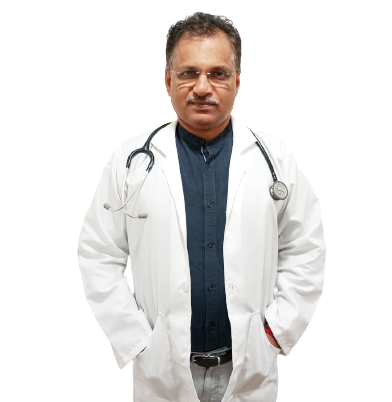


Popular Searches: DiseasesTreatmentsDoctorsHospitalsWhole person careRefer a patientInsurance